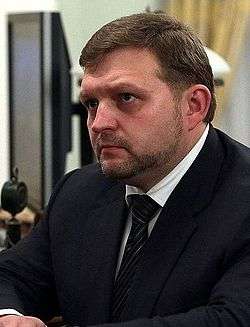Nikita Belykh
| Nikita Yurevich Belykh Никита Юрьевич Белых | |
|---|---|
 | |
| Governor of Kirov Oblast | |
|
Assumed office January 15, 2009 | |
| Preceded by | Nikolay Shaklein |
| Leader of the Union of Rightist Forces | |
|
In office May 28, 2005 – September 26, 2008 | |
| Preceded by | Viktor Nekrutenko |
| Succeeded by | Leonid Gozman (acting) |
| Personal details | |
| Born |
June 13, 1975 Perm, Russian SFSR |
| Nationality | Russian |
| Political party | Union of Rightist Forces (2001-2008) |
| Religion | Russian Orthodox Church |
Nikita Yurevich Belykh (Russian: Ники́та Ю́рьевич Белы́х, born June 13, 1975 in Perm) is a Russian politician and former leader of the Union of Rightist Forces party. He was a member of the Legislative Assembly of Perm Krai (until December 11, 2008), and now is confirmed as governor of Kirov Oblast.
Biography
Nikita Belykh was born on 13 June 1975, graduated from Perm State University. In 1998 he became vice-president of the "Perm Financial-Industrial Group". In 2001 Belykh was first elected to the Legislative Assembly of the Perm Oblast, where he became chairman of the committee on economic policy and taxation.
In December 2003 Nikita Belykh was a parliamentary candidate for the Union of Rightist Forces, which failed to pass the nationwide 5 per cent threshold required for entering the State Duma. In March 2004 he was appointed Deputy Governor of the Perm Oblast.
On 28 May 2005 Nikita Belykh was elected leader of the Union of Rightist Forces, a leading democratic opposition party, succeeding Boris Nemtsov. He thereby resigned as Deputy Governor of Perm. As party leader Belykh adopted a line of strict opposition towards Russian President Vladimir Putin and launched coalition talks with Yabloko party.
As a result of the agreement between Nikita Belykh and Grigory Yavlinsky, reached in October 2005, the Union of Rightist Forces and Yabloko formed a coalition, Yabloko-United Democrats, to contest the Moscow City Duma elections on December 4, 2005. The coalition won 11% of the vote and became one of only 3 parties (along with United Russia and the Communist Party) to enter the new Moscow legislature.
In December 2006 the Union of Rightist Forces received 16% of the vote in the regional legislative elections in Perm Krai. Belykh, who headed the party's list of candidates, was elected to the Legislative Assembly.
In September 2008 Belykh announced that he has resigned from his position and left the Union of Rightist Forces in connection with its likely upcoming merger with a couple of pro-Kremlin parties.
On December 8, 2008, Belykh was nominated governor of Kirov Oblast after personal meeting with Dmitry Medvedev.[1][2] Many of Belykh's former colleagues such as Boris Nemtsov have sharply condemned Belykh's decision to take the President's offer and Maria Gaidar has declared that Belykh "has sold his soul to devil".[3] (From July 2009 till June 2011 Gaidar was an official responsible for socio-economic development in the Kirov region.[4])
Detention
On June 24, 2016, the politician was arrested in a bar by Russian Investigative Committee, allegedly for receiving a bribe of 400,000 Euros. He is currently under investigation and could be facing up to 15 years of jail time if proven guilty.[5] He denied taking bribes or other wrongdoing. According to Dmitry Peskov, there was no any consultations with Putin about making this arrest [6]
References
- ↑ J. Levy, Clifford (2008-12-23). "Russia's Liberals Lose Their Voice". The New York Times. Retrieved March 15, 2009.
- ↑ Badanin, Roman (December 8, 2008). С белого листа (in Russian). gazeta.ru. Retrieved December 8, 2008.
- ↑ "Oppositionist politician is new governor of Kirov Region". Russia Today. December 18, 2008. Retrieved December 20, 2008.
- ↑ Divisions Revealed as Kremlin Critic Moves to Work for Ukraine Government, The Moscow Times (20 July 2015)
- ↑ "Investigators detain Russian governor accused of taking bribe". Reuters. 2016-06-24. Retrieved 2016-06-25.
- ↑ Получил по полной, by grani.ru
External links
- (Russian) Nikita Belykh's official website
- Belykh's blog
- Nikita Belykh's blog posting leads to identity theft (RT article)